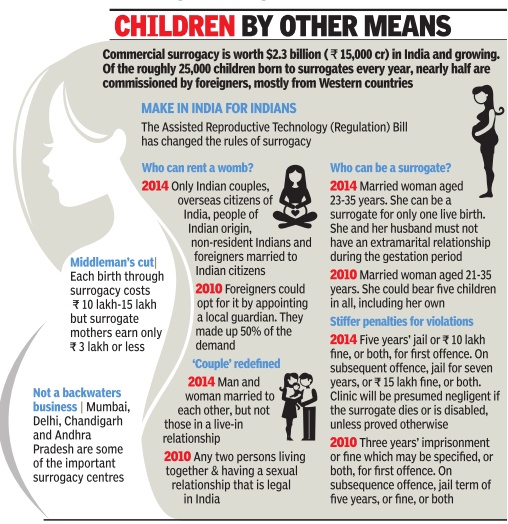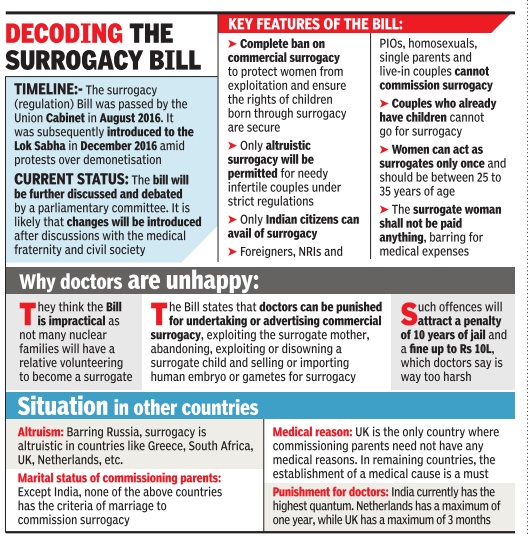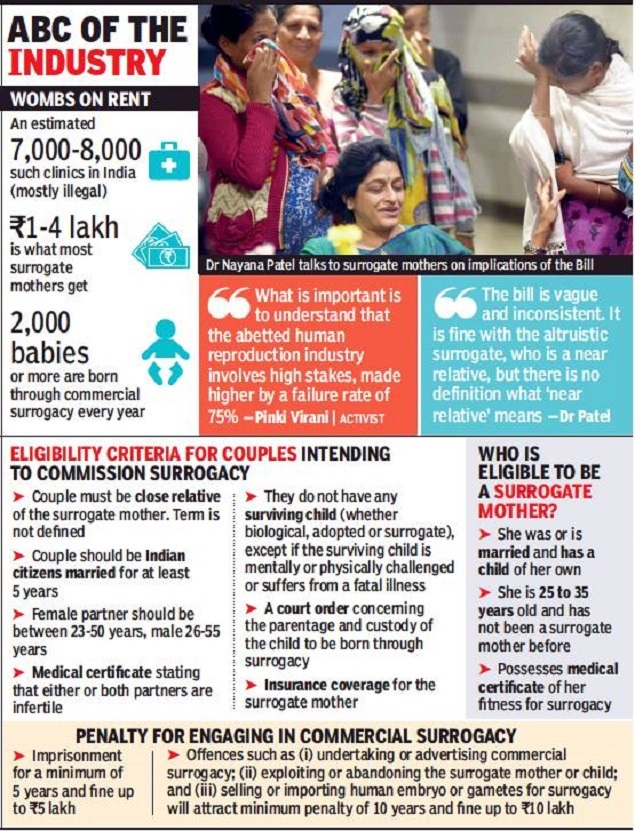Surrogacy, its practice and the Law: India
(→The law) |
(→The Surrogacy (Regulation) Bill, 2016) |
||
| Line 40: | Line 40: | ||
Without taking any names, Swaraj said it was “unfortunate” that couples, who already have a son and a daughter of their own, opt for surrogacy “just because it is fashionable”. | Without taking any names, Swaraj said it was “unfortunate” that couples, who already have a son and a daughter of their own, opt for surrogacy “just because it is fashionable”. | ||
Replying to a question, she said: “We do not recognise homosexual or live-in relationships, that is why they are not allowed to commission babies through surrogacy. It is against our ethos.” | Replying to a question, she said: “We do not recognise homosexual or live-in relationships, that is why they are not allowed to commission babies through surrogacy. It is against our ethos.” | ||
| + | |||
| + | ===Cleared by Lok Sabha/ 2019=== | ||
| + | [https://timesofindia.indiatimes.com/india/lok-sabha-passes-surrogacy-regulation-bill-2016-which-bans-commercial-surrogacy/articleshow/67165408.cms Sushmi Dey, Lok Sabha clears Bill banning commercial surrogacy, December 20, 2018: ''The Times of India''] | ||
| + | |||
| + | |||
| + | Amid protests by the opposition over the Rafale deal on Wednesday, the Lok Sabha passed the Surrogacy (Regulation) Bill 2016, aimed at banning commercial surrogacy to protect women from exploitation. The House also proposed to allow only altruistic surrogacy by infertile Indian couples from a "close relative" only. | ||
| + | |||
| + | The couple also has to be legally married for at least five years and possess a certificate from a doctor stating that they are medically unfit to produce a child, according to the provisions of the Bill. | ||
| + | |||
| + | Singles, homosexuals and live-in couples cannot apply for surrogacy. Besides, couples who already have children will also not be allowed to opt for surrogacy. | ||
| + | |||
| + | The Bill entitles only Indian citizens to avail of surrogacy, whereas foreigners, NRIs and PIOs are not allowed to commission surrogacy in the country. | ||
| + | |||
| + | According to the provisions of the Bill, women within the age group of 23 years to 50 years and men aged between 26 and 55 years will be eligible to go in for surrogacy. The child, thus born, will be deemed to be the legal offspring of the intended couple. Also, a woman can be a surrogate only once in her lifetime. | ||
| + | |||
| + | The Bill was approved by the Cabinet in August 2016. It was introduced in the Lok Sabha in November 2016 and was later referred to a parliamentary standing committee on health and family welfare in January 2017. | ||
| + | |||
| + | Once enacted by Parliament, the national surrogacy board will be constituted at the central level, while the states and Union territories will constitute the state surrogacy boards and state appropriate authorities within three months of the notification by the Union government. | ||
| + | |||
| + | Terming the Bill as historic, health minister JP Nadda said different sections of society, political parties, the Supreme Court and the law commission have spoken against commercial surrogacy and that the Bill addresses these concerns. | ||
| + | |||
| + | The surrogacy (regulation) bill was passed after an hour long debate in the Lok Sabha amid noisy protests by Congress and AIADMK members over various issues. | ||
| + | |||
| + | Though members of different parties who spoke during the debate supported the bill, some including Kakoli Ghosh Dastidar of the Trinamool Congress and Supriya Sule (NCP) exhorted the government to expand its scope. | ||
| + | |||
| + | With no law governing surrogacy, India has emerged as a surrogacy hub for couples from different countries. There have been incidents of unethical practices, exploitation of surrogate mothers and abandonment of children born out of surrogacy. Apart from protecting women from abuse, the bill also aims to protect rights of children born out of surrogacy. | ||
=Prevalence, practice= | =Prevalence, practice= | ||
Revision as of 09:45, 10 January 2019

This is a collection of articles archived for the excellence of their content. |
Contents |
The law
Nov 2015: Bombay HC relaxes bar on foreigners
The Times of India, November 7, 2015
HC relaxes surrogacy bar on foreigners
The Bombay high court in an interim order stayed the directive of the Centre and Indian Council for Medical Research banning surrogacy for foreign couples who are in the final stages of the process, reports Shibu Thomas. Hearing a petition filed by fertility clinics, the court's vacation bench said before introducing a sudden change in policy , prior notice should have been given.
The bench clarified that its order was restricted to cases in the middle of treatment. It asked the clinics to furnish details of such cases to the authorities and barred them from taking up fresh cases of surrogacy for foreign couples.
The Surrogacy (Regulation) Bill, 2016
The Indian Express, August 25, 2016

New surrogacy Bill bars married couples with kids, NRIs, gays, live-ins, foreigners
The government approved a bill that bans commercial surrogacy, and bars single people, married couples who have biological/ adopted children, live-in partners and homosexuals from opting for surrogacy.
The Surrogacy (Regulation) Bill, 2016, cleared by the Cabinet, only allows “altruistic surrogacy” for childless couples who have been married for at least five years. Then too, the surrogate mother should be a “close relative” of the couple, should be married and have borne a child of her own. Briefing the press after the Cabinet meeting, External Affairs Minister Sushma Swaraj said foreigners, NRIs and PIOs who hold Overseas Citizens of India (OCI) cards have also been barred from opting for surrogacy as “divorces are very common in foreign countries”.
New surrogacy Bill bars single parents, homosexuals, live-in couples, foreigners married woman who has at least one child of her own can be a surrogate mother only once in her lifetime. Childless or unmarried women are not allowed to be surrogate mothers.
Without taking any names, Swaraj said it was “unfortunate” that couples, who already have a son and a daughter of their own, opt for surrogacy “just because it is fashionable”. Replying to a question, she said: “We do not recognise homosexual or live-in relationships, that is why they are not allowed to commission babies through surrogacy. It is against our ethos.”
Cleared by Lok Sabha/ 2019
Amid protests by the opposition over the Rafale deal on Wednesday, the Lok Sabha passed the Surrogacy (Regulation) Bill 2016, aimed at banning commercial surrogacy to protect women from exploitation. The House also proposed to allow only altruistic surrogacy by infertile Indian couples from a "close relative" only.
The couple also has to be legally married for at least five years and possess a certificate from a doctor stating that they are medically unfit to produce a child, according to the provisions of the Bill.
Singles, homosexuals and live-in couples cannot apply for surrogacy. Besides, couples who already have children will also not be allowed to opt for surrogacy.
The Bill entitles only Indian citizens to avail of surrogacy, whereas foreigners, NRIs and PIOs are not allowed to commission surrogacy in the country.
According to the provisions of the Bill, women within the age group of 23 years to 50 years and men aged between 26 and 55 years will be eligible to go in for surrogacy. The child, thus born, will be deemed to be the legal offspring of the intended couple. Also, a woman can be a surrogate only once in her lifetime.
The Bill was approved by the Cabinet in August 2016. It was introduced in the Lok Sabha in November 2016 and was later referred to a parliamentary standing committee on health and family welfare in January 2017.
Once enacted by Parliament, the national surrogacy board will be constituted at the central level, while the states and Union territories will constitute the state surrogacy boards and state appropriate authorities within three months of the notification by the Union government.
Terming the Bill as historic, health minister JP Nadda said different sections of society, political parties, the Supreme Court and the law commission have spoken against commercial surrogacy and that the Bill addresses these concerns.
The surrogacy (regulation) bill was passed after an hour long debate in the Lok Sabha amid noisy protests by Congress and AIADMK members over various issues.
Though members of different parties who spoke during the debate supported the bill, some including Kakoli Ghosh Dastidar of the Trinamool Congress and Supriya Sule (NCP) exhorted the government to expand its scope.
With no law governing surrogacy, India has emerged as a surrogacy hub for couples from different countries. There have been incidents of unethical practices, exploitation of surrogate mothers and abandonment of children born out of surrogacy. Apart from protecting women from abuse, the bill also aims to protect rights of children born out of surrogacy.
Prevalence, practice
2018: Curtains in Anand (Gujarat)?

Wombs on rent;
Eligibility criteria for couples intending to commission surrogacy;
Who is eligible to be a surrogate mother;
Penalty for engaging in commercial surrogacy
From: Parth Shastri, Is it the end of road for Gujarat’s ‘baby factory’?, December 23, 2018: The Times of India
On the fourth floor of a swank hospital in Anand – dubbed the “surrogacy capital of India” for the thriving baby business here for the past decade – Gursharan Arora, a resident of Chandigarh, holds her bundle of joy close to her. The little girl was delivered a fortnight ago and she is doing well.
“I had five miscarriages and doctors gave up on me,” she said. “Surrogacy helped me become a mother. I am lucky. But how can the government take this away from other women yearning to be moms,” Gursharan asked on Saturday, days after the Lok Sabha passed the Surrogacy (Regulation) Bill 2016, which blocks commercial surrogacy by terming it a punishable offence for all involved.
Anand-based Akanksha Infertility Clinic, a cornerstone in India’s Rs 1,300 crore-plus commercial surrogacy industry, wore a weary look with surrogate mothers asking each other about the bill. The hospital, helmed by Dr Nayana Patel, has delivered over 100 babies annually since 2010. Sixty-two mothers are in different stages of pregnancy at the facility right now.
Kajal Parojiya, 32, a mother of two who chose to be a surrogate the second time around, is anxious. Her aim, she said, was to ensure good schooling for her children. “My husband makes Rs 5,000 per month. We barely scrape by. In such a situation, the Rs 3.6 lakh that I got for being a surrogate helped me ensure my kids’ education. I opted for this again to build a small house,” she said. “This new law will hit us hard.”
Like Kajal, Varsha Patel, 30, insists that being a surrogate is of her own volition. A first-time surrogate from Vadodara, she told TOI: “Exploitation is not the norm but the exception. Every woman here has come for money – it’s as stark and simple as that. Many are dirt poor. Surrogacy helps them in ways only the marginalised understand.”
A day after the bill was passed, when Dr Patel met surrogates at her hospital, there was fear and apprehension in the air. The doctor quietly told them, “If the Rajya Sabha too passes the bill, this will be the last batch the facility will host.” The announcement was received in silence.
But activists and those concerned about the “abuse” of poor women in the “rent-awomb” world of commercial surrogacy said the legislation was long overdue. Author and campaigner Pinki Virani, who has been calling for a stop to the “unethical trade”, had told TOI earlier that the bill has loopholes, but these are pluggable.
“What is important is to understand that the abetted human reproduction industry involves high stakes, made higher by a failure rate of 75%. Practitioners set themselves up as benevolent fertility fairies even as they perpetuate patriarchy, making a woman feel worthless if she doesn’t have a child. Also, there’s a higher-than-average risk of cancer afterwards and it doesn’t seem to matter that the more convoluted the process of starting a tiny human in a lab, the more complex the after-effects on that child,” she said.
The debate, though, won’t die down in a hurry. “The bill is vague and inconsistent,” Dr Patel said. “It is fine with the altruistic surrogate, who is a near relative, but there is no definition of ‘near relative’. Getting regulations in place is good but completely abolishing the system might pave the way for real exploitation, with families pressuring women to become a surrogate.”
She added, “The trade will be pushed underground. A woman not able to bear a child of her own still has major stigma attached to her in society. In these modern times when infertility is on the rise, the bill is not in sync with social reality. It requires certification of infertility, but ignores male infertility issues, negates other health complications that inhibit conception not coming under the ambit of infertility. Rather than tackle these larger issues, the bill focuses only on infertility.”
The future of Anand’s surrogacy business that provides employment to about 3,000 people in the district stands on slippery ground. It’s an ecosystem that involves doctors, nurses, travel agents, hotels and restaurants, super stores et al. Also known as home to Amul, the town with a sizeable NRI population is set to lose the not-so-flattering sobriquet of ‘baby factory’. In the past decade, while foreign nationals took home 304 babies, NRIs got 307, before a 2015 regulation banned surrogacy for people from abroad.
Sameer Kukreja, a security firm owner, who turned surrogacy advocate after he and his wife spent five years trying for a baby, said, “A majority of those forming the new regulations don’t know the sector or medical intricacies involved. There might be exploitative practices, but better regulation makes more sense than a ban.”
(Some names have been changed to protect identity)
See also
Private lives of Indian (Mumbai) stars > Surrogate parenthood